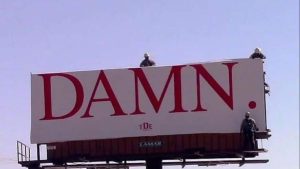Here is the ultimate irony of advertising: You want to get your message out to the public, but private gatekeepers have the final say on what that public sees.
Those gatekeepers look different depending on the industry — they could be a newspaper publisher, a media conglomerate that owns a TV network or, in our case, the vendors who rent space on billboards.
Think about it. Your message doesn’t get out without their final say. While we like to think we’re controlling the conversation through our clever campaigns and bold creative, the gatekeepers actually determine what makes it into the media.
This raises many questions. Where do we draw the line on free speech? Should vendors have the power to censor and filter? And what is our role as an independent agency that advocates for our clients? Here are a few of our thoughts.
Vendors As Censors: The Rap Album Case Studies
First, let’s explain more about what we mean when we say vendors control the conversation. That may sound confusing when we, the agencies, are the ones finding clients, creating creative and picking places to display it.
But vendors still have a great deal of power that often goes unacknowledged. They have the ultimate say on what goes on their billboards, and we think that’s fair — they own the boards, after all, and they make their living off them. This also gives them the power to filter messages that most appeal to them, rejecting sensitive or political content in favor of less controversial messages.
However, that also means that sometimes what we see as the right message, whether from a moral, practical or promotional standpoint, is rejected by a vendor for fear of raising hackles. Here are two cases that illustrate what we mean.
Kendrick Lamar Damn Album
Kendrick Lamar’s fourth studio album, Damn, came out in 2017, and his label came to us with a clear vision of what it wanted on the billboards: an image that matched

the billboard cover, showing the rapper with the word “damn” in red capital letters.
We loved the idea. It was bold, to the point, attention-grabbing, the epitome of good advertising. The vendors we contacted didn’t feel the same way. They were leery of having a single swear word on the billboard with nothing else, and we went several rounds trying to reach a solution appeasing everyone.
The solution was to add the name of the label or distributor, so it was clear this was the name of an album and not a political statement or protest (the album came out in 2017, when plenty of both were going on).
The label didn’t love but lived with that approach — and Kendrick Lamar certainly had the last laugh. The album with the name that made vendors queasy went on to win a slew of awards, including five Grammys and a Pulitzer Prize for Music, the first rap album ever to earn that recognition.
Eminem Kamikaze Cover
About a year later, Eminem stirred up controversy with Kamikaze, his 2018 album whose cover paid homage to the Beastie Boys’ smash 1986 release License to Ill. Like that album, Eminem’s showed a plane crashing into a wall, though the rapper made subtle changes that branded his imagery.

Vendors did not appreciate the visual, homage to an all-time great album or not. They felt the cover was too political and could be seen as insensitive to 9/11 if it was posted on billboards in New York City. By refusing to run the ad as envisioned, they probably felt they were maintaining neutrality on a touchy topic.
But the truth is, the vendor makes a choice in such a case. You could argue they are infringing upon free speech by censoring what is seen. Kamikaze still rocketed to No. 1 on the Billboard charts, but at what cost?
Repeat After Us: Being “Neutral” Is Still Picking a Side
We could go on and on with the examples, including a recent one with a client where the vendor did not even give the client a choice about what happened to their own content in the case of some rather insensitive graffiti. We aren’t sure what the right answers are in most of these situations, but we do feel that vendors who claim “neutrality” are not neutral at all.
They are only allowing messaging they feel comfortable with. Since their values don’t align with everyone’s — that’s the beauty of democracy — it also limits what people are exposed to. By staying neutral and keeping certain ads under wraps, vendors limit what people see and thus what they will discuss.
It’s not as extreme as book banning or religious censorship. Those types of things are more overt. Instead, think of it more along the lines of the long-running net neutrality debate. Who gets to have an opinion? Who defines freedom in a capitalist society?
Vendors Can’t Put Politics Aside. Can We Blame Them?
This is obviously a time of heightened political sensitivity during President Donald Trump’s second term. Vendors are understandably worried about offending an administration that’s quick with the pen on executive orders that target individuals and companies and lawsuits that have already cost media companies millions.
Yet public taste has always swayed back and forth on what’s OK and what is not. We’d argue vendors in the past were more tolerant of risqué content that they won’t accept now. And that can go both ways politically. A few years ago, for instance, vendors wouldn’t touch an anti-vax billboard, but now they pop up occasionally.
Ultimately, we think people should be allowed to face and discuss challenging issues through smart messaging. We don’t want to be the ones drawing the line on free speech, but we also are not sure vendors should. Raising this to the legislative level could run the risk of government censorship, which presents its own issues. At the same time, every vendor has its own unique agenda, and platforming it can shape political views.
Let’s Hear What You Think
Want to talk this over? Do you have a daring idea you want in your next campaign but aren’t sure how a vendor would react? Get in touch today. We want to hear your thoughts and see how we can help.

